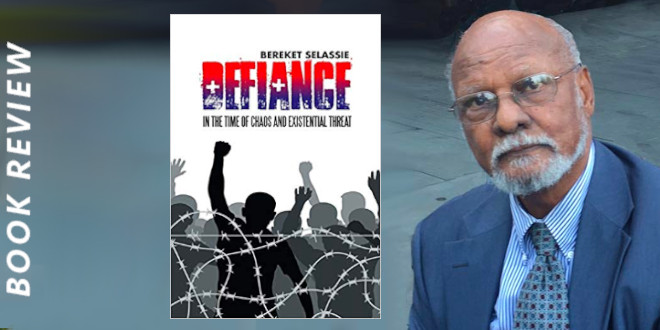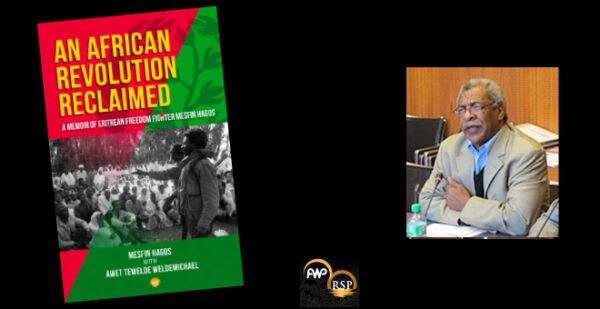Book Review: Defiance In The Time Of Chaos And Existential Threat

Book Title: Defiance In The Time Of Chaos And Existential Threat
Author: Bereket Habte Selassie
Paperback: 264 pages
Publisher: Authorhouse (18 July 2019)
Language: English
ISBN-10: 172831805X and ISBN-13: 978-1728318059
In a world beset by “moral bankruptcy, corruption and the threat of nuclear war,” it is the age-old “phenomenon of migration” that is causing unprecedented tensions and undermining the ties that bind people “within and among nations.” No one understood this better than the late American author, Samuel Huntington, who in his book, The Clash of Civilization, encapsulated the background in which Dr. Bereket Habte Selassie’s latest story takes place: “If demography is destiny, population movements are the motor of history.”
The profundity of Huntington’s pithy and yet loaded sentence could only be unraveled by a few thoughtful and deep thinkers like Defiance’s Stefan Schmidt, a German scholar/activist, and not by the modern-day demagogues, who would stop at nothing to win elections, and have an evident disdain for asking deeper questions.
Dr. Schmidt is one of the three protagonists of Selassie’s new novel. The other two being Rashid Ibrahim, a European football star of Sudanese origin and Isabelle Negassa, a French woman with an Ethiopian father, who was killed by the Mengistu regime when she was an infant living in France.
Defiance is a global story in the new global village where the lofty ideals of an open society, free trade and the universal declaration of human rights are constantly strained by the machinations of political expediency and electioneering. But if professional associations of doctors and journalists could work without borders, why couldn’t the people of the world do so to meet the challenges of the modern global world? So asks Selassie’s Defiance.
Some notable political theorists like Benjamin Barber have already started advocating for the creation of a parliament of mayors, where cities unencumbered by national sovereignty can act locally and collaborate globally. Perhaps the new world of globalism, conceived in the 19th and 20th century world of triumphant nationalism, is falling short because it has not gone far enough. The anachronous structures and ideas have hit a wall and are needlessly hindering progress. The new world has to first clear out the outdated way of thinking.
So many activists have already come to the conclusion that the world cannot have its cake and eat it too, and that tough choices have to be made. A number of non-governmental, non-profit and humanitarian organizations and think-tanks are leading the way and it is this fight that has brought the trio protagonists together enabling them to forge their lasting Platonic and romantic relationships that were occasionally punctured by breakups. They all agree that it is time to move forward with the spirit of the time, and not retreat to the too familiar world of fortress-building, where those who are besieged inside dream of getting out and those kept outside, dream of getting in. The world can debate the “Push or Pull Factor” of migration, but migration is here to stay, and new policies have to be formulated and implemented.
Although, the “phenomenon of migration” is as old as history, the venom and rhetoric of xenophobia and racism—cleverly masquerading under the seemingly benign patriotic slogan of “making America great again,” that the new president of the United States Donald Trump has shamelessly spewed—has compounded the “existential threat.” The genius of the American experiment is not, and was not, to form a “perfect union,” but “a more perfect union.” The responsibility of Americans is to bequeath to the next generation a country greater than what they have inherited from their predecessors. The binding covenant is to make America continually greater and not “great again.” This on-going perfectibility is what makes America the most exhilarating political experiment ever devised by mankind. America is an inherently forward-looking, young and optimistic country, where every generation finds it glory in the endless possibilities of the future and not the stagnant past. Immigrants are an integral piece of keeping the American spirit young, fresh and vibrant.
It is this on-going perfectibility that has made America exert unprecedented influence in the world. The truth is: what goes for America goes for the world. Up to now—for the most part—America has well-played the role of the shining city on the hill. It is mind-boggling to the German Stefan Schmidt how the country that has championed the tearing down of walls in his home-country, only three decades ago, has suddenly become the one that wants to build them in its own backyard. The irony is that Trump’s pillar of support comes from people who wear the Bible under their sleeves conveniently ignoring that, “Whoever loves a quarrel loves sin; whoever builds a high gate invites destruction.”
Not long ago, Lady Liberty “lifted its lamp besides its golden doors” to the “homeless,” “the tempest-tossed,” “the poor,” and “the huddled masses yearning to breathe free.” Now Trump tells them “go home,” “you’re causing crime and big problems,” “the US is ill-prepared for your invasion and we’ll not stand for it.”
Sadly, Trump is forfeiting America’s moral leadership by failing, in the words of Lincoln, to strengthen “the bonds of affection” among all people by touching them “by the better angels” of America’s nature. It is for this reason that many Americans have taken it upon themselves to be good Samaritans and show kindness and mercy to the many immigrants stranded in the temporary shelters on the southern border. It is also the reason the author, an immigrant himself, has dedicated his book to, “The Migrant father and his daughter who drowned while crossing the Rio Grande.”
Trump aside, the problem of migration is as complicated as it is too familiar. Migration is the rule and not the exception in human history and since there is no agreed upon cut-off time on when one ceases to be an immigrant, it is safe to say that people all over the world are some sort of migrants. Wars, conquests, famine, exploration, and the search for greener pastures have driven people all over the world from one part of the world to another and everywhere in between. The power relation between the new comers and those who have been there has necessitated many shades of gray, but, semantics aside, it is the same old story of people moving from one place to another to resettle, find employment and better opportunities, and escape persecution.
Conquerors, colonizers, expatriates, and refugees are all immigrants of some sort. But in a world that has not fully exorcised itself from the shackles of historical biases, prejudices and a sense of racial and ethnic superiority, a Mexican working in the US is a migrant worker while an American working in Mexico is an expat. The expat is—supposedly—a modern-day missionary with a burden of spreading commerce and civilization; he is the good guy who has to brave the hardship of the less-developed South for more altruistic reasons than naked self-interest. He is a boon to the South while the immigrant from the South is a burden to the North. This is what drives the vitriol against immigrants from what Trumps calls “shit-hole” countries and the rise of right-wing nationalist parties in several Western countries.
The world might have gone mad on politics, but the book reminds us that there are still human values that make us laugh and cry and happy and sad. It is an intelligent book that sheds light on the human condition. When all is done and said, Defiance is a human story of love, friendship and humanity. Isabelle’s desire to connect with her father’s family and find his remains in unmarked mass-graves is as touching as it is edifying. It is this love and human desire to connect that takes the trio to several countries and three continents and knock on the doors of power. It is what took them to Ethiopia where they met a former freedom fighter who has become an extremely wealthy government official and notorious philanderer after his group took power in the country, replacing the unelected government of Mengistu Hailemariam. In an interesting word-play, his name was Teshome—one who was appointed to a position of authority through legitimate means. In a culture that harks back to the Middle Ages, Teshome was the victor who got all the spoilage; it was his turn and that was all the legitimacy he needed. It is hard not to feel that Defiance is art mimicking life.
Defiance is a book about the sublime as it is about the mundane, the lofty as well as the base. Sometimes the characters command respect, and other times rebuke, but over all, they exhibit human frailties, vices, virtues, and capriciousness and in trying moments they show their true colors and what they are really made-of; they become whole and that makes all the difference. There is hope for humanity.
Defiance will make you realize that the shoe that fits one pinches another. A culture of empathy, as the author have said in his earlier works, is all that one needs to remain fully engaged in the story.
I strongly recommend Dr. Bereket’s book, “Defiance”. It can be purchased from Amazon: Defiance.


Awate Forum